African American History
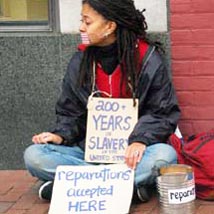
“Living Flag”
damali ayo & Dmae Roberts
A woman panhandles on a city sidewalk, taking money only from white folks, and giving it to blacks passing by. She is artist damali ayo. Her sign reads: “200 Years of Slavery in the United States. Reparation payments accepted here.” (9:02)
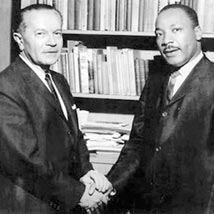
“Dr. King at Temple”
Queena Kim
Martin Luther King. Jr. delivered a sermon in 1965 at Temple Israel, Hollywood. He was invited by Rabbi Max Nussbaum, who had used his pulpit against injustices in Nazi Germany. His widow Ruth, now 95-years-old, remembers the day. (6:00)

“Segregated Movie Set”
Ben Adair
On the set of the 1940 movie Gone With the Wind, black and white actors were originally segregated. Until actor Lennie Bluett, an extra on the set, alerted Clark Gable to the situation. (2:00)
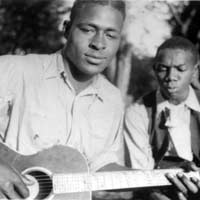
“1930s Florida Folklife”
Barrett Golding
1930s WPA recordings made (by Zora Neale Hurston and others) across Florida, from the Cross City turpentine camps to the Clara White Mission soup kitchen in Jacksonville. Narrated by recording-expedition leader Stetson Kennedy. (22:24)

“Paintmixers”
damali ayo & Dmae Roberts
Performance artist damali ayo heads to the hardware store for paint in shades of dark brown… matching her face, inner thigh, left breast. “He said, ‘I’ve never done a flesh tone’ which I liked, because it was the first time my skin was referred to as a flesh tone.” (5:44)
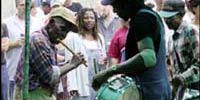
“Otha Turner’s Picnic”
Ben Adair
Moonshine, barbecued goat and the last of the old-time Fife & Drum picnics thrives in Mississippi’s Northern hill country, connecting two traditions: “Fife & Drum” evolved from early American military music, and the Great Picnic sharecroppers’ celebration. (13:10)

“Cargo Man”
Crossing the BLVD
After losing his wife, daughter, and livelihood, Bovic Antosi escapes the Democratic Republic of Congo as cargo, only to end up in a detention center next to JFK airport for two years. From Crossing the BLVD: interviews with immigrants now living in Queens NY. Song by Kinglsey Ogunde from Nigeria. (5:28)
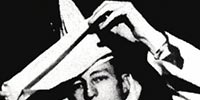
“The Klan Unmasked”
Stetson Kennedy
The book, The Klan Unmasked is Stetson’s story of infiltrating and undermining the Ku Klux Klan. He recalls the incident, the impact, and the “Nazi-minded Klansmen.” (4:25)
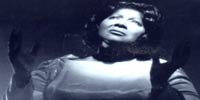
Mahalia Jackson
Gospel music’s great Mahalia Jackson recorded for Decca and Columbia, had her own CBS radio sow, performed at John F. Kennedy’s inauguration and Martin Luther King, Jr’s funeral. In this 1950s interview she recalls her youth in the “Black Pearl” section of New Orleans, singing in the Baptist Church. (4:20)
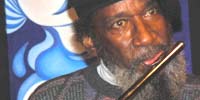
Eluard Burt
The last New Orleans flautist, Eluard Burt, leads us thru the the flavors, feelings, spices, and sounds of his Missisippi River city; accompanied by recordings of French Quarter street musicians in Jackson Square and on Bourbon Street. (5:28)
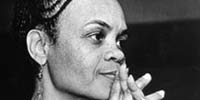
Sonia Sanchez
Sonia Sanchez performs her poem “To all you youndg girls.” Produced by Steve Rowland and mixed by Joe Waters (a commission from WXPN with funding from the Pennsylvania Council on the Arts) with original music by Jamaaladeen Tacuma. (2:01)
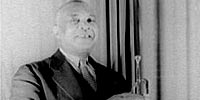
W.C. Handy
W.C. Handy’s 1912 sheet music for his “Memphis Blues” was the first blues published. In the next decades his songs made the Billboard charts dozens of times. Handy’s “St. Louis Blues” was a hit for the Mills Brothers, Bessie Smith, Louis Armstrong, Guy Lombardo, Rudy Valee, Cab Calloway, and Benny Goodman. In 1958, when he died, 150,000 people lined New York City’s streets for his funeral. (10:58)
Juneteenth
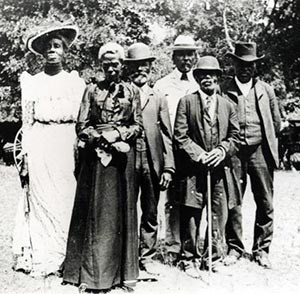
A Juneteenth celebration, also known as Emancipation Day, in Texas, June 19 1900
The interviews and photos are from “Voices from the Days of Slavery,” a web exhibition of the American Folklife Center at the Library of Congress. We present the audio excerpts in our online Juneteenth celebration.
Juneteenth was June 19, 1865, also called Emancipation Day and Freedom Day:
In January 1863 The Emancipation Proclamation abolished slavery, even in slave-holding states that were part of the Union. But, in Texas, no one told the slaves that. The owners worked them for two-and-a-half more years. Not until two months after the Civil War ended, did these African-Americans finally find out they were free.
Image Gallery: 1778–Now
Credits
- damali ayo is an author and performance artist.
- Dmae Roberts runs MediaRites Productions.
- Queena Kim is Marketplace Senior Reporter.
- Ben Adair is a Senior Editor at Marketplace..
- Crossing the BLVD is stories from Queens, New York by Judith Sloan and Warren Lehrer.
- Steve Rowland produced a series of Sonia Sanchez poems with musician Jamaaladeen Tacuma.
- Stetson Kennedy was an author, folklorist, environmentalist, labor activist, and human rights advocate
- Barrett Golding runs this HV Radio Rodeo.
- The images are from the Library of Congress African American History Month online exhibit and the Wikimedia Commons.

























